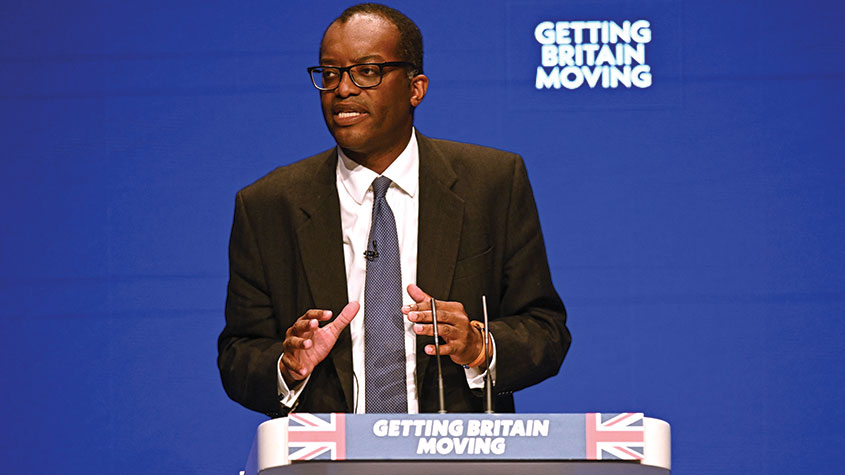The “plan for growth”: what Truss and Kwarteng got right
The Tories’ “plan for growth” has got off to a bad start, but their reforms can still transform Britain


Get the latest financial news, insights and expert analysis from our award-winning MoneyWeek team, to help you understand what really matters when it comes to your finances.
You are now subscribed
Your newsletter sign-up was successful
Want to add more newsletters?

Twice daily
MoneyWeek
Get the latest financial news, insights and expert analysis from our award-winning MoneyWeek team, to help you understand what really matters when it comes to your finances.

Four times a week
Look After My Bills
Sign up to our free money-saving newsletter, filled with the latest news and expert advice to help you find the best tips and deals for managing your bills. Start saving today!
It was probably the shortest tax cut in history. A little more than a week after announcing the end of the 45% top rate of tax, chancellor Kwasi Kwarteng was forced into a humiliating U-turn. In reality, he had no choice. His mini-budget had been savaged by the markets, had put Labour 30 points ahead in the polls, and was likely to be defeated by Conservative backbenchers in the House of Commons.
With this rapid U-turn, the government’s “growth plan” – using supply-side reforms to improve incentives, and to make the UK more competitive, enterprising and efficient – has taken a huge blow. Perhaps something can be salvaged from the project. Perhaps. But Kwarteng and prime minister Liz Truss will have to change their strategy.
Here are three places they could start.
MoneyWeek
Subscribe to MoneyWeek today and get your first six magazine issues absolutely FREE

Sign up to Money Morning
Don't miss the latest investment and personal finances news, market analysis, plus money-saving tips with our free twice-daily newsletter
Don't miss the latest investment and personal finances news, market analysis, plus money-saving tips with our free twice-daily newsletter
1. Assume the City isn’t on your side
First, don’t assume the City or Wall Street will be on your side. The financial sector has no special attachment to free market liberalism. Banking is one of the most heavily regulated, uncompetitive and state-dependent sectors of the economy, and most of the people working within the industry are hostile to any form of deregulation.
Nor are they very interested in the results. The currency traders and hedge-fund managers are not looking at overall growth a few years out. They are only looking at sentiment around the next bond issue. If they see a space to attack they will.
A reforming government looking to improve the supply side of the economy will have to assume the City will oppose it all the way. That means it will have to lock down its forecasts before it launches any new plans, as well as making sure the Bank of England is on board to deal with any fallout.
2. Stay away from the news
Next, avoid the headlines. It’s the big eye-catching measures – such as ending the bankers’ bonus cap or scrapping the 45% tax rate – that stir up real opposition. It is even worse when they suggest the government doesn’t care about equality or fairness.
In fact, the Truss government has already made some genuinely positive changes that will help boost growth significantly. Changing the ridiculous IR35 tax rules that allowed the Inland Revenue to hound many self-employed people out of work will make a big difference.
So will scrapping the data-protection rules that have dramatically reduced the number of tech start-ups. They are quite dull and technical changes, so no one really notices them very much, and hardly anyone gets upset aside from a few specialists. But they will make as much difference to growth as the top rate of tax.
3. Focus on the priorities
Finally, focus on key structural reforms. That means removing planning barriers that have stopped the UK from building enough homes; lifting the bizarre solvency rules that prevent pension funds from investing in infrastructure projects that would both make money and help the country run more smoothly; or removing the restrictions on fracking that have stopped the UK from supplying its own energy. The planned investment zones will be the most important component of that. If they are bold enough, and big enough, they could liberalise huge swathes of the country and generate lots of fresh investment.
In reality, there was lots of this good stuff last week – gritty, detailed measures that will make a real difference to growth. In the 1980s, the big wins of the Thatcher government were privatising the state-owned monopolies, taming trade unions, and selling off social housing to increase home ownership. Many of them, such as curbing union power, were done so gradually it was hard to oppose them.
Likewise, the big wins of the Truss government – if it survives for more than a few weeks – could be building new houses, restoring the incentives to work, re-booting the City and ending the EU’s crazily heavy-handed regulation of technology and science. If it focuses on those priorities, the growth plan can still work and supply-side reforms can still boost the economy. But the lessons of a bad week need to be learned or it is just going to end in defeat.
Get the latest financial news, insights and expert analysis from our award-winning MoneyWeek team, to help you understand what really matters when it comes to your finances.

Matthew Lynn is a columnist for Bloomberg and writes weekly commentary syndicated in papers such as the Daily Telegraph, Die Welt, the Sydney Morning Herald, the South China Morning Post and the Miami Herald. He is also an associate editor of Spectator Business, and a regular contributor to The Spectator. Before that, he worked for the business section of the Sunday Times for ten years.
-
 How a ‘great view’ from your home can boost its value by 35%
How a ‘great view’ from your home can boost its value by 35%A house that comes with a picturesque backdrop could add tens of thousands of pounds to its asking price – but how does each region compare?
-
 What is a care fees annuity and how much does it cost?
What is a care fees annuity and how much does it cost?How we will be cared for in our later years – and how much we are willing to pay for it – are conversations best had as early as possible. One option to cover the cost is a care fees annuity. We look at the pros and cons.
-
 Was Margaret Thatcher great for Britain?
Was Margaret Thatcher great for Britain?The 'Iron Lady’ would be celebrating her 100th birthday this month. Margaret Thatcher rose to power in 1979 as the first ever female prime minister and was one of the most controversial leaders in history, but how did her policies shape today’s finances?
-
 UK wages grow at a record pace
UK wages grow at a record paceThe latest UK wages data will add pressure on the BoE to push interest rates even higher.
-
 Trapped in a time of zombie government
Trapped in a time of zombie governmentIt’s not just companies that are eking out an existence, says Max King. The state is in the twilight zone too.
-
 America is in deep denial over debt
America is in deep denial over debtThe downgrade in America’s credit rating was much criticised by the US government, says Alex Rankine. But was it a long time coming?
-
 UK economy avoids stagnation with surprise growth
UK economy avoids stagnation with surprise growthGross domestic product increased by 0.2% in the second quarter and by 0.5% in June
-
 Bank of England raises interest rates to 5.25%
Bank of England raises interest rates to 5.25%The Bank has hiked rates from 5% to 5.25%, marking the 14th increase in a row. We explain what it means for savers and homeowners - and whether more rate rises are on the horizon
-
 UK inflation remains at 8.7% ‒ what it means for your money
UK inflation remains at 8.7% ‒ what it means for your moneyInflation was unmoved at 8.7% in the 12 months to May. What does this ‘sticky’ rate of inflation mean for your money?
-
 Would a food price cap actually work?
Would a food price cap actually work?Analysis The government is discussing plans to cap the prices of essentials. But could this intervention do more harm than good?